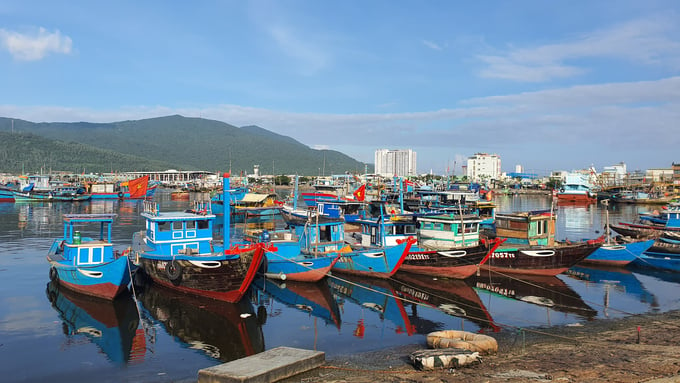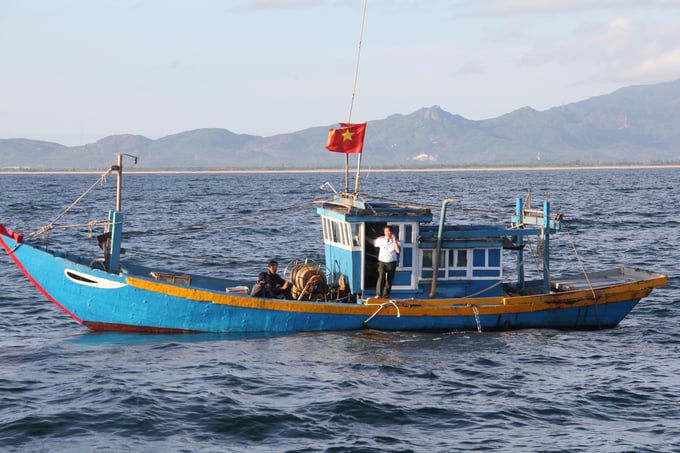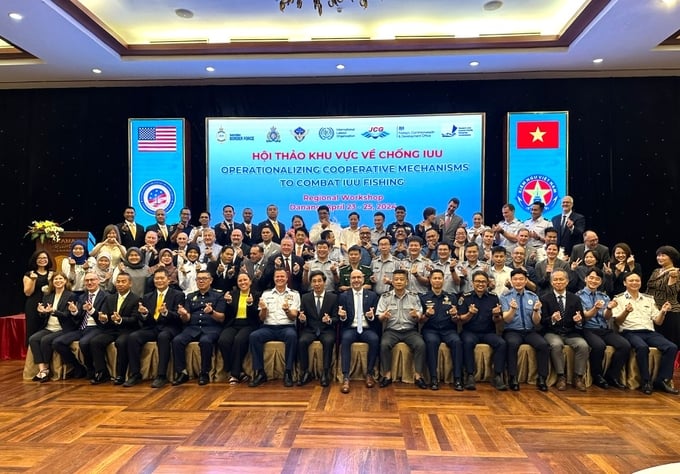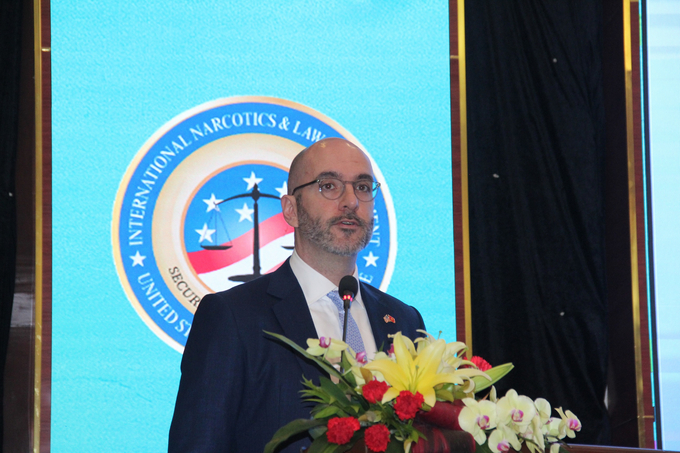May 20, 2025 | 00:27 GMT +7
May 20, 2025 | 00:27 GMT +7
Hotline: 0913.378.918
May 20, 2025 | 00:27 GMT +7
Hotline: 0913.378.918
On April 23, the US diplomatic delegation in Vietnam, through the Bureau of International Narcotics and Law Enforcement Affairs (INL) and the United States Coast Guard (USCG), collaborated with the Directorate of Fisheries to organize a regional workshop on combating illegal, unreported, and unregulated (IUU) fishing.

Currently, in Vietnam, over 97.65% of fishing vessels have installed cruise monitoring equipment. Photo: L.K.
IUU fishing poses one of the most serious dangers to marine ecosystems and the pursuit of sustainable development. Each year, IUU fishing yields are projected to be up to 20 million tons, severely hurting fishermen's livelihoods, particularly in coastal areas, deepening poverty and creating food security problems on a national and international scale.
Vietnam understands that sustainable fisheries development is critical to combating IUU fishing. In recent years, Vietnam has created and executed a comprehensive strategy and programs for fisheries exploitation, aquaculture, protection, conservation, and aquatic resource development. This involves a major emphasis on establishing a sustainable fishing industry, market-oriented responsibilities, environmental friendliness, resource preservation, biodiversity conservation, climate change adaptation, illness prevention, and social security.
Simultaneously, a coordinated strategy with defined targets and solutions has been implemented across the system, from central to local levels, particularly in coastal regions, with active support from government officials, organizations, and fishing communities.

Law enforcement at sea has been implemented very aggressively in recent times by Vietnam. Photo: L.K.
According to Mr. Tran Chi Cuong, Vice Chairman of the Da Nang People's Committee, Vietnam has achieved remarkable results through these efforts, including: high awareness and decisive actions at all levels, sectors, fishing communities, businesses, and societal consensus in implementing legal regulations and measures to combat IUU fishing.
Vietnam has also built a comprehensive legal framework for international-standard fisheries management; established and operated a national database on fishing vessels, connecting from central to local levels; and provided database accounts to law enforcement agencies and port management authorities to control fishing activities. Over 97.65% of offshore fishing boats (with a length of 15m or more) are fitted with voyage monitoring technology (VMS); provenance tracing of aquatic goods has been adopted and managed throughout the supply chain, etc.
At the regional workshop on combating IUU fishing, in addition to exchanging information and updating global trends in the fight against IUU, challenges in the fisheries sector, and initiatives to improve cooperation and information sharing, an overview of the Western and Central Pacific Fisheries Commission and tools for monitoring, controlling, and surveilling fishing vessels (MCS) were discussed. worldwide specialists also shared their experiences dealing with IUU infractions on a local and worldwide scale via hypothetical scenario exercises.

Coastal countries will strengthen cooperation and sharing to prevent IUU fishing. Photo: L.K.
Mr. Duong Van Cuong, Deputy Director of the Directorate of Fisheries (MARD), noted that IUU fishing is the biggest danger and challenge to the fisheries sector's growth, and it is a shared worry across coastal countries. Vietnam's attempts to prevent IUU fishing are now gaining considerable government support. In particular, the Party Central Committee recently hosted a nationwide conference, both in person and online, to execute Directive 32 of the Party Central Committee and Government Resolution 52 on action plans to implement Directive 32.
"Following this meeting, we will continue to work to boost IUU fishing prevention initiatives in 2024, particularly in the lead-up to the EC delegation's fifth inspection in Vietnam. This meeting, conducted in Vietnam, is likewise quite important. Vietnam's law enforcement agencies, such as fisheries inspection, border guards, coast guards, and fisheries management authorities, will be able to share and update information, experiences, knowledge, trends, and legal tools to improve their capacity to combat IUU fishing," Mr. Cuong stated.
According to the Bureau of International Narcotics and Law Enforcement Affairs at the US Embassy in Hanoi, this session is appropriate given the increasingly complex difficulties of illicit, unreported, and unregulated fishing.
Combating IUU is not just individual nations' duty, but also a global problem. Improving collaboration and information sharing is critical for successfully combating IUU and ensuring sustainable fisheries resources.

Mr. Ryan McKean, Director of the Department of Narcotics Prevention and International Law Enforcement, US Embassy in Hanoi, said that currently the United States and Vietnam are working together to develop a multifaceted action plan to support Vietnam in combating IUU fishing and protecting sustainable aquatic resources. Photo: L.K.
The comprehensive strategic collaboration between the United States and Vietnam acts as a compass, reflecting the US government's commitment to developing and strengthening Vietnam's maritime law enforcement authorities in a variety of areas, including IUU prevention. The United States is dedicated to fostering a strong, independent, prosperous, and resilient Vietnam. This workshop demonstrates the two countries' complete strategic collaboration, which will solve difficulties in a manner that will benefit both countries in the long run.
Mr. Ryan McKean, Director in Charge of the Bureau of International Narcotics and Law Enforcement Affairs at the United States Embassy in Hanoi, stated that the Directorate of Fisheries, along with other maritime law enforcement agencies in Vietnam such as the Vietnam Coast Guard and the General Department of Customs' Anti-Smuggling Investigation Department, is an important partnership.
In 2024, in addition to this regional workshop program, the bureau engaged with the Directorate of Fisheries to improve capacity and develop collaboration with regional nations on IUU prevention.
Translated by Linh Linh

(VAN) As a doctoral student doing research on renewable energy and electrification at Harvard University, the author shares his musings on electricity, nature, and countryside memories.

(VAN) The decree on Extended Producer Responsibility (EPR) ensures transparent management and disbursement of support funds, avoiding the creation of a “give-and-take” mechanism.

(VAN) Hue City rigorously enforces regulations regarding marine fishing and resource exploitation, with a particular emphasis on the monitoring of fishing vessels to prevent illegal, unreported, and unregulated (IUU) fishing.

(VAN) Hanoi People's Committee has issued a plan on reducing greenhouse gas emissions in the waste management sector with 2030 vision.

(VAN) Vietnam's draft amendment to Decree No. 156 proposes a mechanism for medicinal herb farming under forest canopies, linking economic development to population retention and the sustainable protection and development of forests.

(VAN) In reality, many craft village models combined with tourism in Son La have proven effective, bringing significant economic benefits to rural communities.

(VAN) The international conference titled Carbon Market: International experiences and recommendations for Vietnam was successfully held recently in Ho Chi Minh City.